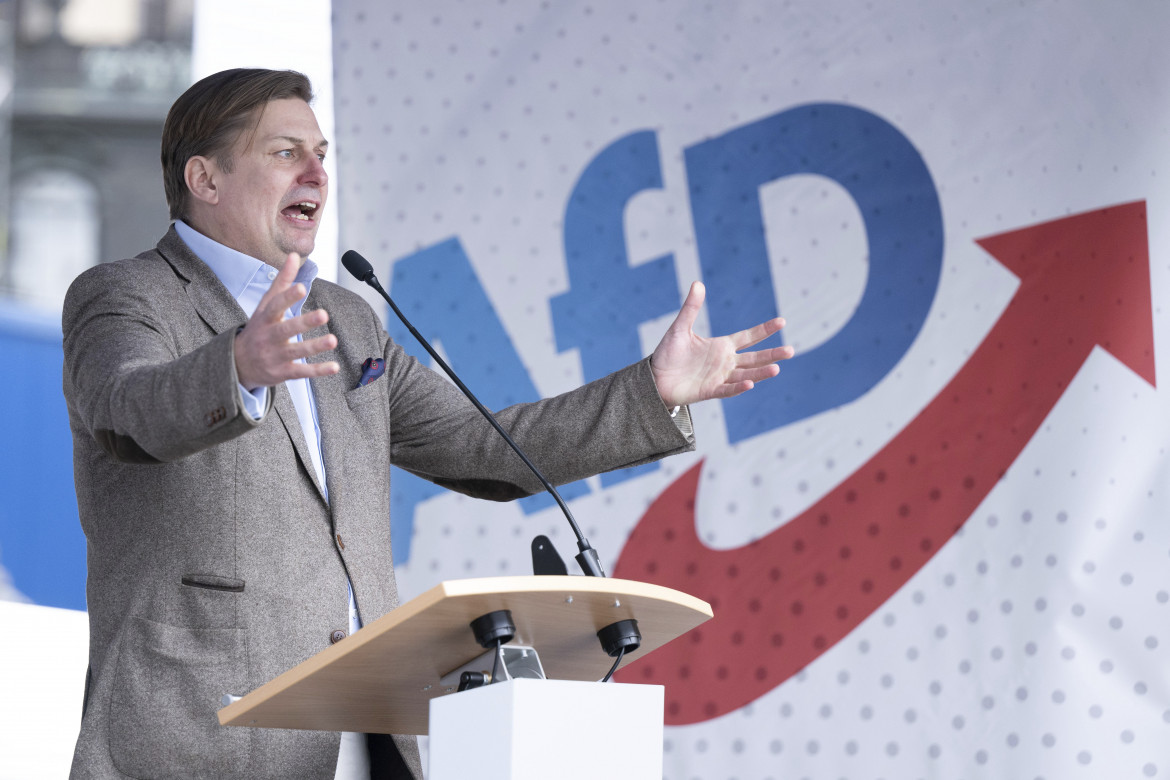Analysis
Tug of war in European Parliament heats up, with Meloni at the center
The cutting of ties with the leader of the pro-Russian AfD has removed one of the obstacles to a convergence between ID and ECR, but if they want to influence the future European government, they will need centrists.

Alternative for Germany (AfD) is out of the Identity and Democracy (ID) group in the European Parliament. This was announced in a dry statement released by the Brussels-based parliamentary group’s bureau: “The ID Group no longer wants to be associated with the incidents involving Maximilian Krah, head of the AfD list for the European elections.”
The far-right German MEP got on the bad side of Marine Le Pen, followed closely by her ID ally Matteo Salvini, after he gave an interview to La Repubblica in which he claimed that “the SS were not all criminals.”
It’s certainly not the first time such ideas have been expressed openly; however, in a climate of jockeying for position for post-election alliances, they were immediately seized upon by the French NR leader. Also on Sunday, Le Pen, on the occasion of the populist right-wing conference in Madrid, had warm words for Italian Prime Minister Giorgia Meloni, effectively signaling the start of talks for a collaboration between the right-wingers in Brussels, which could even go as far as a single parliamentary group, something they have long hoped for but never realized because of their different orientations in international politics between pro- and anti-Putin.
The last-minute attempt by the AfD to ban its own leader from making public statements was to no avail. Last Thursday afternoon, after a few hours of debate on how and when the rift within ID would be consummated, the parliamentary group decreed the expulsion of the German delegation “with immediate effect.” The decision was made by a majority vote, with the French National Rally delegation and the Lega delegation voting in favor.
The news spread just as the third debate between would-be presidents of the EU Commission (now referred to by the typically complicated German term of Spitzenkandidaten) was taking place in Brussels – certainly the most important one, as it had a quasi-official nature.
The debate in Brussels, conducted in a TV studio setting and featuring attempts to sound vaguely like popular programming, featured five list leaders representing the political groups in the European Parliament. Notably absent were the right-wingers from ECR, because they haven’t nominated a Spitzenkandidat, and from ID, because the Danish Anders Vistisen was only a spokesperson. The Left group was represented by Austrian Communist Walter Baier, the liberals of Renew Europe by the Italian Sandro Gozi (elected in France), and the Greens by their co-leader, the German Terry Reintke. Rounding up the list were the Luxembourg Socialist Nicolas Schmit, the incumbent Labor Commissioner, and, most prominently, the incumbent Commission president running for another term, Ursula von der Leyen for the EPP.
When the host, journalist Annelies Beck from Flemish public broadcaster VRT, asked her if she would be willing to collaborate with Giorgia Meloni in a future majority, Ursula, clearly faced with a difficult answer, started with the usual Christian Democrat diplomatic wisdom: “I have been working very well with Giorgia Meloni in the European Council, as I do with all the heads of state and government. This is my task as president of the Commission.”
Then she stressed that the European Parliament is very different from national parliaments; first of all, because compromises have to be made, otherwise no laws will be passed. Then, because much depends on the (individual) “members of the European parliament. I want to see where they group themselves,” she said, stressing that it’s not yet clear how the groups will be made up.
But which individual MEPs was she talking about? Von der Leyen digressed from the initial question to get to the point she was particularly keen to make: that one can enter into dialogue with individual MEPs (perhaps including those from FdI) beyond group affiliations. She outlined three clear criteria: they must be “pro-European, pro-Ukraine/against Putin and for the rule of law.” Who would fit that bill?
While unwilling to extend this to the ECR as a whole, von der Leyen claimed that Meloni fulfills these criteria, saying that after the elections we will see “whether those who are pro-European – and she is clearly pro-European – against Putin – she’s been very clear on that one – and pro-rule of law. If this holds – and then we offer to work together.”
This is certainly not the case with Le Pen, she clarified in a tweet: “We must be clear-eyed: Rassemblement national, AfD, Konfederacja… Different names – but all the same. They are Putin’s puppets and proxies and they are trampling on our values. We will not let them destroy what we have built together.”
The cutting of ties with the leader of the pro-Russian AfD has removed one of the obstacles to a convergence between ID and ECR, the two different containers into which far-right parties have organized themselves. However, if they want to influence the future European government, both ECR and ID will have to look to the centrists of the EPP, with or without von der Leyen at the helm: the real deciding factor for all future alliances. And, at least initially, they will have to play by their rules.
Originally published at https://ilmanifesto.it/von-der-leyen-si-a-meloni-no-a-collaborare-con-le-pen on 2024-05-24
